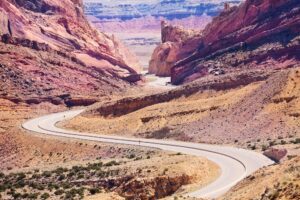It is good to have an end to journey toward, but it is the journey that matters in the end.
~ Ursula K. Le Guin ~
The word “journey” comes from the Old French word, “jornee” which meant a day, a day’s travel or a day’s work.
Centuries ago, a day’s travel didn’t get you very far as you either walked or rode a horse or some other animal. Since the average walking speed of a human is 3-4 miles per hour (assuming you aren’t burdened with a backpack or other things), people travel, at most, 40 miles in a day, but most likely 20-30, depending on their fitness and stops for meals or rest periods, and traveling only while the sun is up. For pilgrims, the destination could take months of bad weather, hunger, and other threats to life and health.
Those who were literate, like nobles and monks, often recorded their travels in another related word, journal. Both journal and journey have the root, jour, or day. Imagine how much knowledge of the world those travel accounts contributed to knowledge and understanding.
In June, as Bob and I drove across the deserts of Arizona, New Mexico, and Texas, I wondered how the native populations had lived and survived in what, to me, appeared to be a hostile environment. Barren, rocky, thorny, and hot, 104 degrees hot.

And yet…
What great opportunities for story shimmered in the heat. The landscape itself creates conflict, much like the sea did in Hemingway’s Old Man and the Sea.
My own In the Land of the Vultures has a landscape that is barren, dry and hot. It shaped how my heroine thought and acted, her water-conscious habits serving as a trigger for intimacy with the hero when he catches a tear on his finger.
The myths and legends of any region are keys to the struggles and challenges of the peoples that inhabit any environment. What stories did those long-ago travelers, seeking land, gold and freedom, wrote in their journals?
Growing up, one of the television shows my family watched regularly was Wagon Train, a series about a caravan of covered wagons traveling from Missouri to California. As a child, I thought how neat it would be to have everything you needed in a wagon, and how, each day/jour of the journey brought a new adventure. But watching it in black and white on television isn’t the same as experiencing it, is it?
Remembering that, I was grateful for the air conditioning in the car as I gazed out at the an intimidating landscape that stretched for miles. Nope, wouldn’t want to be in that covered wagon whose seats would be hard after only a few miles. Nor would I want to worry about running out of water or being attacked by thieves.
So I admire the courage and commitment those pioneers, explorers and immigrants to a new country possessed, then and now.
Any journey is a risk, whether it is inward or outward. Dangers and discomfort are often inevitable. And a journey has the potential to change you.
What journeys are you planning? Will you keep a journal of them?

